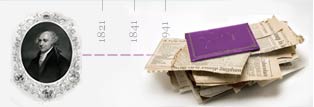Phil Moir's Blog
Welcome to the new Genes Reunited blog!
- We regularly add blogs covering a variety of topics. You can add your own comments at the bottom.
- The Genes Reunited Team will be writing blogs and keeping you up to date with changes happening on the site.
- In the future we hope to have guest bloggers that will be able to give you tips and advice as to how to trace your family history.
- The blogs will have various privacy settings, so that you can choose who you share your blog with.
Official Blogs
In 1904, Henry B Turnbull boarded a ship in Southampton bound for South Africa, never to return to his home town of Edinburgh and unlikely to ever see his parents or siblings again. Some 43 years later, after both the Great War and the Second World War had ended, he invited his older brother Adam (my great-grandfather who was 82 at the time) to visit him in his new homeland of South Africa. This is the letter written by Adam Turnbull, recounting the troubled decisions he had to make before taking on the flight, the bizarre encounters with people who knew his name, the journey in incredible detail and sadly, only briefly of his experiences in South Africa. Even more sad is the scant mention about his family reunion. And then he recalls the sudden departure by ship because of illness (or home-sickness), his journey through the destruction that was still evident in post-war London and finally his return to Edinburgh.
Note. My father believes that the letter was in fact Adam's notes of a talk he gave to his church congregation about his travels, and this may explain the lack of personal details about his reunion with Henry and his sister. It also might explain why he refers to "describe" at various times through the written text.
If you haven't read the first instalment covering Henry's voyage to South Africa, then I recommend reading this first. Click here for Henry's voyage to South Africa in 1904. The following is an almost completely unedited version of Adam's letter/notes and the images are all taken from photos, newspaper clippings and documents saved by his family. The words and opinions are those of Adam Turnbull at the time of writing in 1947.
~ ~ Adam Turnbull's letter ~ ~
I got an invitation from my brother to come out to South Africa for a few months' holiday - It would do me good and prolong my life; he said he could not come to Scotland as the cold would kill him. He did not think the heat in South Africa would kill me; although I am 5 years older than him. My family said "Go, Dad you will enjoy the sea voyage."
I started to make enquiries about ships to South Africa at MacKays, Edinburgh and also shipping offices in Glasgow, but got no definite promise of a ship for a year or 18 months; I appealed to my nephew in the Government Office London and he got in touch with a friend in the office of the Union Castle line and he advised me to come to Southampton and wait for a pier head jump, but I thought that was too risky for a young man like me; so they put me on their books and my number was 2,000. I went back to MacKays office in Edinburgh and they advised me to try a plane, but before I started my great adventure of flying to South Africa I asked God's guidance, if I was to go, I would be quite pleased and if not, I would be pleased and in my bible reading that morning, I turned to Isaiah 41.13 which reads "For the Lord thy God will hold thy right hand saying unto thee, fear not, I will help thee - and in Psalm 17 - I show thy marvelous loving kindness Oh thou that savest by thy right hand, them that put their trust in Thee; so I decided to go out in the sure promise of His word and I may say I had many answers to prayer in my going out and coming home. Never do a thing and then ask God's blessing, but first ask God's blessing and then do that thing; so I got an offer from MacKay's office that a plane was going in March from Prestwick to Amsterdam and then on to Joburg South Africa. I left Edinburgh for Glasgow and was three days there and took a bus one early morning for Prestwick.
I left Prestwick for Amsterdam in a small plane only 12 passengers. I had a great number of forms to sign and then to pass the customs which was a very tiring job and I was very glad it was all over. My daughter could not get in to see me off. I was the last to leave the shed to go to the plane with the stewardess; a man with a camera said "Walk slowly Mr Turnbull". I wondered how he knew my name and he asked me to stand on the steps of the gangway up to the plane; all this time they were calling us to hurry up. I asked the camera man what paper he represented, but he did not say and as soon as I got in we were off. (Note. We don't know why the newspapers took his picture and how the photographer knew who he was, but we do have copies of two of the original photographs that were taken, and these articles appeared in Scottish National papers.)
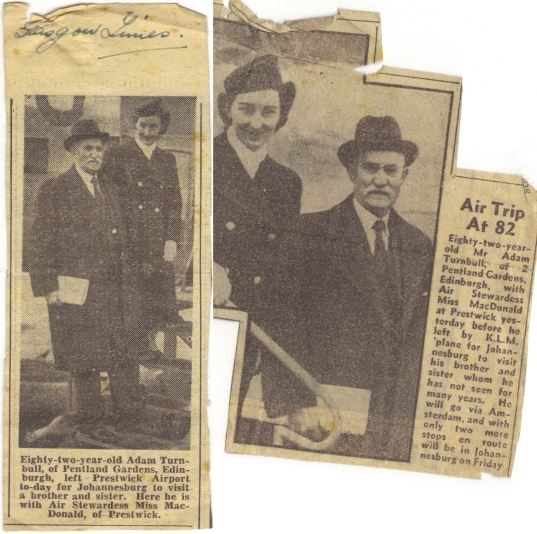
Glasgow Times and another paper clippings reporting Adam Turnbulls departure
We seemed to have a long runway, but we rose very gently to 1,000 ft, but I could not tell you his speed, but in a few hours we were landed in Amsterdam. Then came the struggle again of more forms to sign and to declare all you had which I was able to complete very well; always someone came to my help, everyone seemed to know my name and that I was going to Joburg and gave me the best of attention. I just got into the bus to take me to the Hotel which was in the centre of the city, 6 miles away, when a young lady came in and sat down beside me and asked if I was Mr Turnbull. I said "Yes". She was the wife of the Secretary of the Youth Hostels in Amsterdam. My son-in-law, (Note. This was my grandfather, Donald G Moir, who was Honorary Secretary of the Scottish Youth Hostel Association.) had written to him to look out for me and as he was busy he sent his wife, a very charming lady. She was a great help to me and got me settled in the Hotel. It was some Hotel. I never was in a place like it. My bedroom was very large and a telephone to the head porter and a bathroom off your bedroom. I had a good sleep and down to breakfast at 8.30am. The rule of the road there is to the right and everybody seemed to be on wheels, bikes old and new, a good many running on the iron rims. A great part of the city was flooded during the war. During the war the Germans took all their cars so they had plenty of petrol, but no cars; cigs and tobacco were also taken by the Germans. The Dutch had to pay a few pounds for 20 cigs, but when I was there the docks were booming. The first ship to come in to Amsterdam was an Italian. The whole country was severely rationed worse than Briton. The Germans made an awful mess of it, but it's almost back to normal again.
Amsterdam has a church for almost every denomination in the City. Amsterdam is the heart of the Netherlands and has the best means of communication with every part of Holland and also the large cities of Europe by air which is situated some 6 miles from the centre of the city and is one of the best airports in Europe. So, after a few days in Amsterdam, I left on our first hop, 12 hours late. They changed it from midnight to the afternoon which gave us a chance to cover a good distance in day light. We had a long runway and stopped after minutes to heat up the 4 engines and then we rose up very smoothly in the air to about 9,000 feet. (Note. The flight departed on Wednesday, 26th March 1947. It's intended route was Amsterdam - Tunis - Kano - Leopoldsville (now known as Kinshasa) - Johannesburg.)
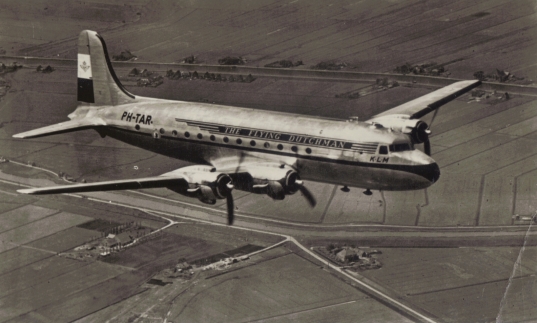
Adam flew on KLM flight PH-TAS
I think I will tell you at this stage something of how we fared in the plane. We were 50 passengers and crew and 2 stewardesses. On board a plane there is no over-crowding and no danger of having to stand. Each passenger being allocated a comfortable armchairs and books and magazines are provided and reading lights (describe). The Captain came and had a chat with me on one or two occasions and I asked him what was his speed - he said 230 mph. Air sickness was not so bad, only a few who had to get attention. If you are very nervous and think you will be sick, well you are sick, but the Captain is very good - he flies above or below the storm patch. I forgot to mention you are allowed 66 lbs of luggage free, excess of that cannot be guaranteed. Relations must say goodbye before passengers enter the customs buildings. They are kept separated from the others after they have entered the building and in view of the Customs Officer . Every passenger has a certain seat reserved in the plane before you embark and you are given a Cabin Plan and a list of passengers (see chart).
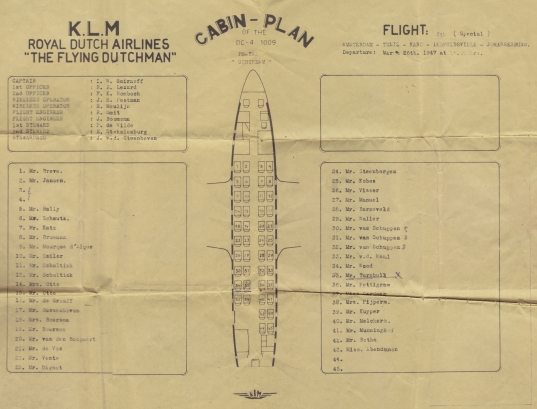
Cabin plan for KLM flight PH-TAS
You are also told what to wear, shirts with collar attached, braces are apt to cause discomfort, a belt is preferable, rugs are in the chairs, fountain pens are apt to leak if they are half full, as a result of the change in the atmospheric pressure. Everything is done for your comfort. No strong scented flowers are allowed, nor alcoholic drink is allowed and you are advised not to eat or drink when flying above 10,000 ft. You can have electric shaving free. Stewards are not allowed to accept tips. You may write letters and postcards and the steward will see they are posted. Smoking is not allowed at certain times, such as taking off and landing. All this is done for your comfort. My chair number in the plane was 35 on the port side (that is the left side looking forward) You had always to go to your arm chair when the Captain thought we were going through a dense cloud. He put a red light up - belts on (describe) We had very good food, breakfast - ham and eggs, plenty of white bread and jam. At 10am the stewardess brought a large tray of all kinds of sweets. "Take what you like" 11 o'clock coffee and cake, dinner at 1 o'clock - Soup and mixture of vegetable and sauce, fried rice, a leg or roast chicken and a glass of tomato juice to wash it down and a large apple. (Trip to Kano) We did not stop at Kano (see chart) but made up lost time and passed on to Leopoldville in the Belgian Congo. Looking out of the porthole, the scene was like the snow-covered Alps, the clouds were like a great sea of snow; sometimes there is a break in the clouds and you can see away down towards the earth. What a wonderful sight it is. (Note. Kano is after Tripoli which is neither on the flight plan nor in the route sequence, so there is a little confusion in context, but this is unedited.)
We are going very steady just now, but we've been told we will have to sleep in the plane tonight (describe) seats and blankets. We had a very quiet night, but yet it was difficult to get a good sleep owing to the noise of the engine. We had a wash and a good breakfast. The steward gave us a form to fill up as a sweepstake to tell the time we would arrive Tripoli, but we did not land at that port, but passed on to Leopoldville. We are now passing through mountains and valleys of thick clouds and when you are passing through one of them, that is the time the plane gives a bump or jolt and a roll and sickness comers on (describe bags) - belts on. We had a splendid run down to Leopoldville (see chart) and touched down after 3 days out. We had to go through customs again and declare all we had. This place is in the Belgian Congo and you are subject to malaria, but it is generally through the night that you get the bite from a mosquito. You are supposed to have a net over your bed (describe). We went off our course to go round the Victoria Falls (describe).
We were off early in the morning on our last lap to Joburg (See chart). We had a splendid breakfast in the plane which I have already described; We were timed to land at Joburg at 5pm and we touched down at that time, just like a train running to timetable. It was after 6pm before I was clear of the Customs and D your cases - turned out and forms to sign. I had one night at Joburg. It is a lovely city. I put up at the largest Hotel and dined with the Manager and Sub Managers and some friends as everything had been booked by my niece. I had a good night's rest and down to the breakfast and the next morning by 8am in a small plane to Durban. We touched down in a little over 3 hours; the pilot circled round the town twice just to let the passengers see the town from the air (see PC). (Note. Sadly this postcard could not be found.) My niece was at the airport with her car and I was soon at my brother's Hotel - a lovely place 20 miles from Durban. I could walk for hours and not be out of the garden. It is called the River Gardens Hotel - flowers, fruit and palm trees.
The place is called Amanzimtoti, or Sweet Waters, where Chaka the infamous old time Zulu despot is said to have slaked his thirst and afterwards given to King Kitchawayo from Queen Victoria for life.
(Note. For details of my investigations into the River Garden Hotel see my previous post, Henry's voyage to South Africa in 1904.)
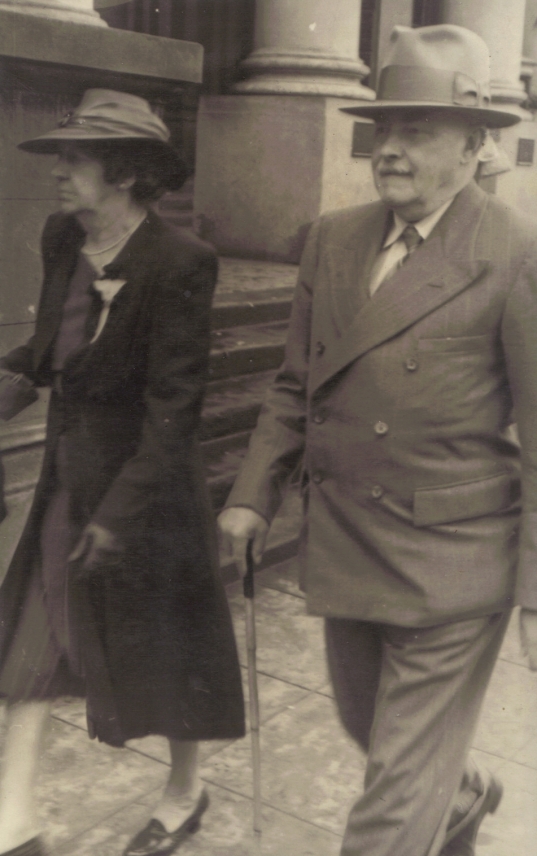
Adams sister in law and brother, Fay and Henry Turnbull
I counted 8 cats in the house one day and I asked "what is the reason for all the cats". They are kept to kill snakes. One big tom killed a big snake 3 feet long: I went to the Baptist Church in Durban. It was a very fine Church. The Deaconess and Deacons welcome you at the door. The service was much the same as our own. It was communion that day; I spoke to the minister on leaving and told him I was from Edinburgh. He said C.C. I said no Granton. It was Easter holidays when I was there and the Royal family had just left, but the city was still very gay. They gave Royalty a great welcome and spared no end of money. The Indian women and girls are all very well dressed in their gay coloured dresses and plenty of jewellery, of course, they were from all parts to see the Royal family, so they made a holiday of it. The English and African girls think a lot of themselves and drive their own cars, every 4th person has a car so it shows there is plenty of money about. The Rickshaw men are in great numbers and will drive you a long distance for a small sum. His headdress of horns and feathers 3 feet in length from his shoulders and their feet white washed up to the knees and they attempt to make a design on the side of the legs; thousands, young and old, go to the beach every day. They bathe and then lie in the hot sun. The Children have special bathing pools with little boats and rafts and the Zulu girls keep a watch over them. Durban to me is a very fast city. The number of beer shops for Europeans and natives is appalling and women and young girls drink with the men and smoke quite openly. Of course drink of all kinds is very cheap. Sitting at my table in the Hotel was the Second Office and Second Engineer of the of the Cable ship in the harbour (describe). So Africa they say is a good country to live in especially for white woman. They can get plenty of servants (local) a girl or boy gets 30p per month and a good skilled cook gets up to £7 and £8 per month. This gives the Lady of the House plenty of time to go shopping and to entertain her friends. Shopping is a pleasure. You can buy what you want; no coupons needed; all ladies love shopping. There is a shortage of such things as meat, sugar, soap and not much butter, but vegetables are very cheap and plentiful and fruit of all kinds in the Bazaars you can buy from a needle to an anchor. Woollies has a very large store. You can spend a whole forenoon in it. Most houses in Durban are of the bungalow type with a little garden and veranda to shade your rooms from the hot sun. I was talking one day to a merchant from the Transvaal and he said there is no place in the whole of South Africa like the Transvaal. The climate is lovely 9 months in the year and there is plenty of work for everyone who is willing to work. He would advise a young man to come out and work 9 months or a year and rent a house or buy one and send for his wife and children. He would be sure of a house for her when she arrived as there is a shortage of houses in the whole of South Africa
At this time I had to see a Dr and he gave me a good overhaul and he thought I should go home, so booked my passage in the Union and explain my interview with the Manager about my Dr Certificate. Castle Ship Carnarvon Castle, to said from Capetown. From Durban it is 1270 miles and to go by train it takes over 3 days. When you buy your ticket, your carriage number is on your ticket and it is very easy to find. 4 passengers to a compartment (describe) The dining room like Hotel. To take the train from Durban to Capetown you see the map of South Africa unrolled. Before you the high mountain passes, the fertile valleys. 3 days and you have seen a continent. It is a journey, an experience, an adventure that has comfort, a railway that is a triumph of engineering. You are carried across mountain, river and plain in a wonderful electric train.
We arrived after a very comfortable journey. My Hotel was near the station and I was soon settled. I took a walk one day to see where the Royal family had landed. The docks were 2 and a half miles from the town. Along this 2 and a half miles stands were erected all the way, one on both sides to hold 10,000 to 15,000 people and a car park at the back of the stands. The whole town was decorated with flags and all colour of lights. I think C. Town is a very fine city, but hilly. I called on the Manager of the Prudential Assurance Company and we had a great time together talking shop - He called for me the next day with his car and drove me all around Cape Town and I dined at his Club , a beautiful place about 15 miles out of Cape Town I was very fortunate in my travels, always someone came to my help. While I was making enquiries about the time of sailing, a Lady asked me if I thought she could get on board to see her friend (describe). I found out I could get on board on this Sunday afternoon by paying a little extra as the time for sailing was the Monday 5pm. I was very glad to do that to save the crush on the Monday. We had a big push on the Monday from early morning; before going aboard I had to show my ticket and passport and go before the Customs and fill up more forms and to state the amount of money of travellers cheques you had. I got a pass to go on boards and the number of my bunk. It was a long way from the stair down to our quarters. In this cabin we had over 50 passengers in it as it was still a troop ship. The food was very good and plenty of it. It is served on the Cafeteria principle (describe). My first dinner is at 6.30pm. We had tomato soup, fish, roast beef, roast potatoes, vegetables, plum pudding and sauce and a large apple. They vary it every day, but always plenty of fruit. We are 2,000 passengers and 200 children and we left at 5pm sharp. We are now out on the rolling deep - the first for me for over 50 years. Three days out we had our first life belt drill. It was a very tame affair. We passed one of the Company ships in the morning; after another 3 days we had life boat drill. I thought the sailors were very slow at it. We have now travelled over 1,000 miles from Cape Town We have to travel another 1,000 before we cross the line. It is very warm and everyone is in their light clothes and the weather beautiful. Sport goes on all day and dancing at night - 11 concerts by the children and passengers. We crossed the line and Father Neptune never came aboard. We have now travelled 2,175 miles from Cape Town. We called at Las Palmas to refuel at 5pm one night and left in the morning. I went ashore to see the merchants selling all sorts of things (describe). We are now 5,021 miles from Cape Town nearing the Bay of Biscay. We had 5 ministers on board and I went to the Service. The Captain led the service. He read everything from the book, but I got a shock when I went into the lounge after the service. (Describe) A pleasant passage and we arrived at South Hampton at 2am but did not get ashore until 1pm. Had to pass the customs again, but got through all right without any trouble (Describe letter T). I was in the first train for London, but went on to East Croydon for a few days. I saw nothing but destruction from the German V1's and V2's. They came over day and night. I went up to London and saw the destruction there - Whole streets of lovely buildings down.
I took train for bonny Scotland and in passing Portobello Station, I said "Sweet Edinburgh I smell ye now" and was thankful to be home again.
~ ~ End of letter ~ ~
This article did not involve any ancestral searching, but I felt it worth sharing as Adam is very descriptive about what he feels, sees and experiences. And it gives an alternative travel prespective from his brother's voyage some 43 years earlier. Sadly both gentlemen died in 1950, but it is good to see that despite all the years apart, they did get together in the end.
The postcard shown above of the KLM plane was sent to my grandmother, Ada Turnbull, Adam's daughter. It read:
"27.3.47 My Dear Ada, This is the plane I've been doing all the flying in and I am very glad we are on the last lap. We are at Leopoldville for the night and expect to be at Joburg tomorrow afternoon. I am still OK and remembering all your instructions to me. Everybody has been very kind to me. Now that we have landed the heat is awful. I did not get time yesterday to change into my light clothes, but all the passengers was changed. Much love Dad x"
Comments
|
Send Message |
What a wonderful descriptive account, it really brought it alive to me, all those lovely personal details,conjured up a time long past. A real piece of social History i would say.How caring & personal the flight sounded,info about what to wear for comfort, the attention of the captain, the sweepstake........fantastic. The end of the journey,seeing all the bomb damage in E Croyden & London just fixed it in time. A precious document, thank you for sharing it jennie langley
|

